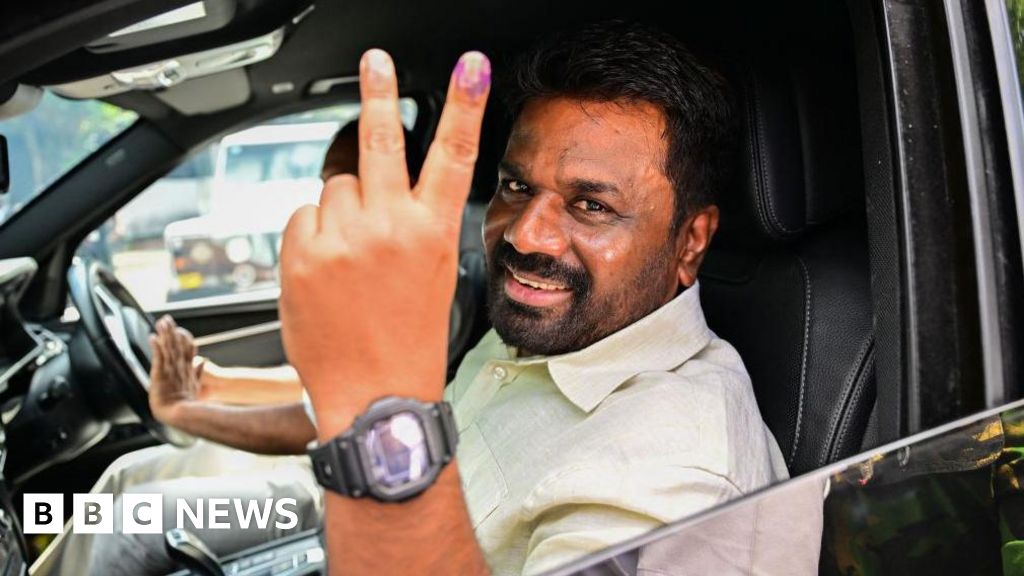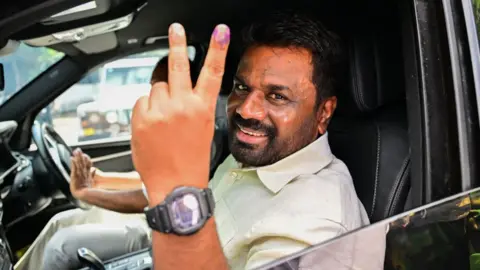
 Getty Images
Getty ImagesThe alliance of Sri Lanka’s new leader is headed for victory in the country’s snap parliamentary elections, according to partial official results.
President Anura Kumara Dissanayake’s National People’s Power (NPP) coalition has so far won 97 seats and more than 60% of the vote. It needs 113 seats in the 225-member house to secure a majority.
Dissanayake, who was elected in September, needs a clear majority to deliver his promise to combat corruption and restore stability after the island’s worst-ever economic crisis.
The high cost of living was one of the key issues for many voters.
Analysts expect the NPP to do well in the elections but what remains to be determined is the margin of victory, and whether it gets the two-thirds majority it wants to be able to pass its ambitious reforms.
In the outgoing assembly, Dissanayake’s Janatha Vimukthi Peramuna (JVP) party, which now leads the NPP, had just three seats. More results are expected later on Friday.
“We believe that this is a crucial election that will mark a turning point in Sri Lanka,” the 55-year-old Dissanayake told reporters on Thursday after voting in the capital Colombo.
Nearly two-thirds of former MPs chose not to run for re-election, including prominent members of the former ruling Rajapaksa dynasty.
Sajith Premadasa, the man Dissanayake defeated in the presidential elections, led the opposition alliance.
Dissanayake called for snap elections shortly after he became president to seek a fresh mandate to pursue his policies. There was “no point continuing with a parliament that is not in line with what the people want”, he had said.
Out of 225 seats in the parliament, 196 MPs will be directly elected. The rest will be nominated by parties based on the percentage of votes they get in what is known as proportional representation.
High inflation, food and fuel shortages precipitated a political crisis in 2022 which led to the ousting of President Gotabaya Rajapaksa. His successor Ranil Wickremesinghe managed to negotiate a bailout package worth $3bn with the International Monetary Fund – but many Sri Lankans continue to feel economic hardship.
“We are still stuck with the problems we faced before. We still don’t have financial help even to fulfil our daily needs,” 26-year-old garment factory worker Manjula Devi, who works in the Katunayake Free Trade Zone near Colombo, told the BBC.
The number of people living below the poverty line in Sri Lanka has risen to 25.9% in the past four years. The World Bank expects the economy to grow by only 2.2% in 2024.
Disenchantment with established political players greatly helped the left-leaning Dissanayake during September’s election. His party has traditionally backed strong state intervention and lower taxes, and campaigned for leftist economic policies.
Dissanayake made history as Sri Lanka’s first president to be elected with less than 50% of the vote. Many observers think his alliance will do better this time.
How his alliance fares will be partly due to a fragmented opposition – with many leaders and parties breaking away into either smaller groups, or contesting as independent candidates.
Observers say the JVP-led alliance ran a more vibrant campaign than the opposition, which is likely to have a significant impact on the outcome of the election.
What is clear is that whoever comes into power will be under massive pressure to perform and live up to their campaign promises.
Sri Lanka’s economic situation remains precarious – and the main focus is still on providing essential goods and services. How the country progresses from this point will be a real challenge for the new government.
Additional reporting by Kelly Ng

